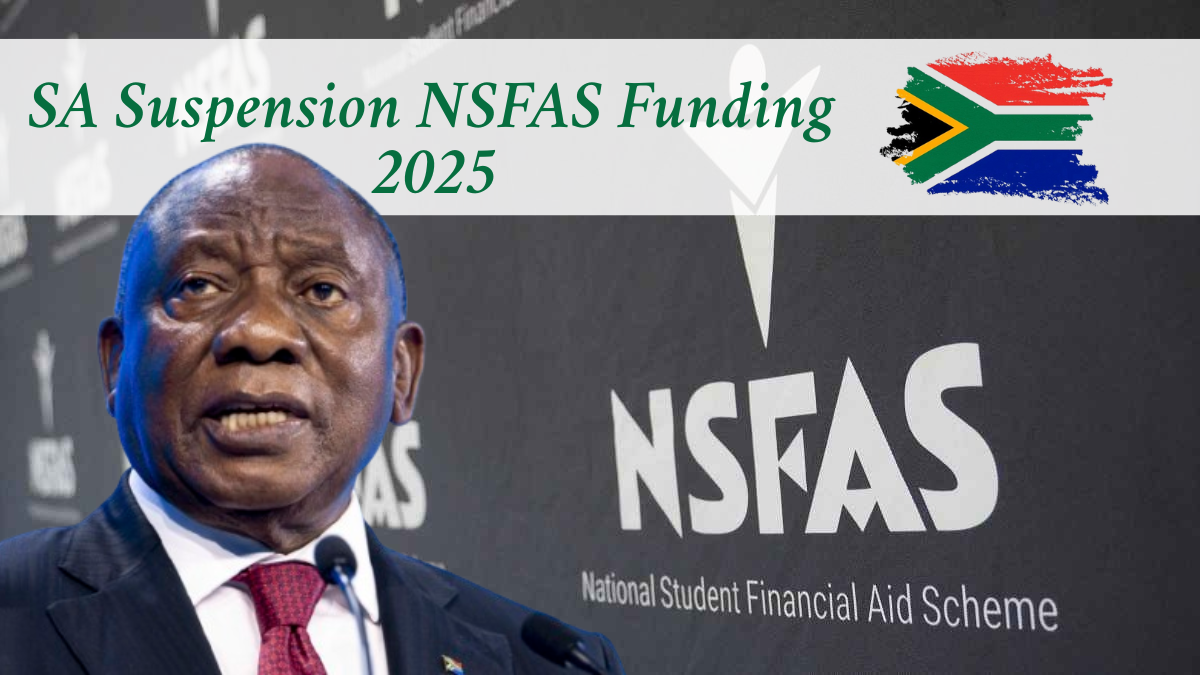In May 2025, thousands of South African students were left in uncertainty as the National Student Financial Aid Scheme (NSFAS) suspended all disbursements. Whether for tuition, housing, or living expenses, this disruption has put academic futures on pause for many. Understanding the reasons, knowing your rights, and taking immediate action are essential to minimize the impact.

Summary Table: SA NSFAS Funding Suspension May 2025
| Detail | Information |
|---|---|
| Suspension Date | May 17, 2025 |
| Expected Duration | Until late May or early June 2025 |
| Reason for Suspension | Audit and verification of disbursement processes due to irregularities |
| Who Is Affected | University and TVET students across SA relying on NSFAS |
| Affected Funding Areas | Tuition, accommodation, living allowances |
| Action Required by Students | Contact institutions, monitor NSFAS, seek emergency support |
| Official Site | www.nsfas.org.za |
Why Was NSFAS Funding Suspended in May 2025?
On May 17, 2025, the Department of Higher Education and Training (DHET) confirmed a temporary freeze on NSFAS disbursements. The reason? Ongoing audits and a verification drive responding to:
- Allegations of mismanagement
- Irregular disbursement practices
- Technical and administrative system failures
While NSFAS aims to resume payments by early June, students are advised to plan for delays.
Who Is Affected by the Suspension?
This suspension affects all NSFAS-funded students at public universities and Technical and Vocational Education and Training (TVET) colleges. Impacted students include those:
- Awaiting tuition payments
- Dependent on NSFAS for student housing
- Relying on monthly allowances for food and transport
Although some institutions have promised interim support, implementation varies by campus.
Immediate Steps Students Should Take
1. Contact Your Financial Aid Office
Reach out to your university or TVET college’s financial aid department. Confirm:
- Whether your funding status remains valid
- If the institution will offer temporary accommodation or meal assistance
Request official confirmation in writing for your records.
2. Follow Official NSFAS Updates
Stay up to date by regularly checking:
- www.nsfas.org.za
- NSFAS Twitter and Facebook pages
- Press releases from DHET
Avoid relying on social media rumors or unofficial advice.
3. Speak With Your Landlord or Housing Provider
If you’re staying in NSFAS-funded accommodation:
- Notify the landlord or residence manager
- Request a payment extension or deferral plan
- Get the agreement in writing
Most institutions are encouraging landlords to avoid evictions.
4. Apply for Emergency Aid
Your university may offer:
- Emergency bursaries
- Food parcels
- Transport vouchers
Contact your student affairs or welfare office to find out what is available and how to apply.
5. Join Student Support Networks
Many student organizations are mobilizing to provide mutual support. These groups can help with:
- Food and meal sharing
- Group transport
- Mental health and peer support
Look for initiatives via student unions or campus WhatsApp groups.
6. Keep Records of Everything
Document:
- NSFAS communication
- Institutional correspondence
- Receipts for any out-of-pocket expenses
This will help if reimbursements or formal appeals are needed later.
Quick Action Plan
| Step | Action | Purpose |
| 1 | Contact financial aid office | Confirm funding status |
| 2 | Monitor NSFAS updates | Stay informed, avoid disinformation |
| 3 | Notify your landlord or residence | Negotiate rental terms or deferral during the gap |
| 4 | Apply for emergency relief | Access food, transport, or short-term financial help |
| 5 | Join student groups | Peer support and resource sharing |
| 6 | Save all records | Prepare for future claims, reimbursement, or appeals |
Long-Term Considerations
If the NSFAS funding delay continues beyond June, students may need to explore alternative solutions:
- Apply for bursaries through NGOs, churches, or municipal programs
- Consider part-time work, if permitted by your institution
- Use educational loan options for the short term (consult your school about options)
- Engage with student leadership advocating for accountability and policy change
FAQs on NSFAS Funding Suspension May 2025
Q: Why were NSFAS payments suspended?
A: Due to an audit uncovering irregular disbursements and system errors.
Q: When will the funding resume?
A: NSFAS and DHET expect disbursements to resume by late May or early June 2025.
Q: Do students need to reapply?
A: No. Previously approved students remain eligible. Check your institution to confirm status.
Q: Can students be evicted during this period?
A: Most universities are asking landlords to offer grace periods. Always inform and negotiate with your provider.
Q: Where can I get help with food or transport?
A: Contact your campus welfare or student services office to ask about emergency support programs.
Conclusion
The suspension of NSFAS disbursements in May 2025 has disrupted the academic and personal stability of many students. However, this is a system-level issue, not a personal failure. By taking practical steps, seeking institutional support, and staying informed, you can minimize the disruption and continue your education with resilience.
Use the available resources—university support offices, student networks, and official NSFAS communications—to protect your progress and prepare for reinstatement.
For official updates, visit: www.nsfas.org.za
Click Here To Know More